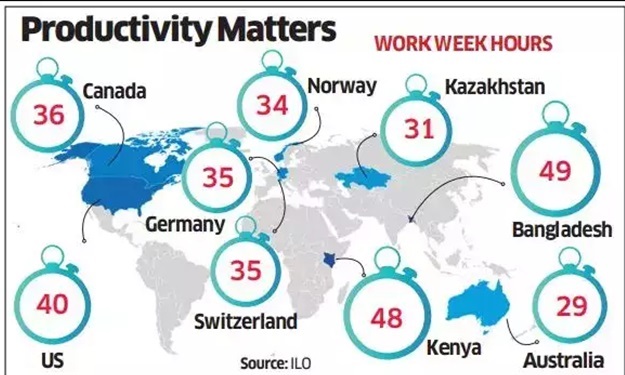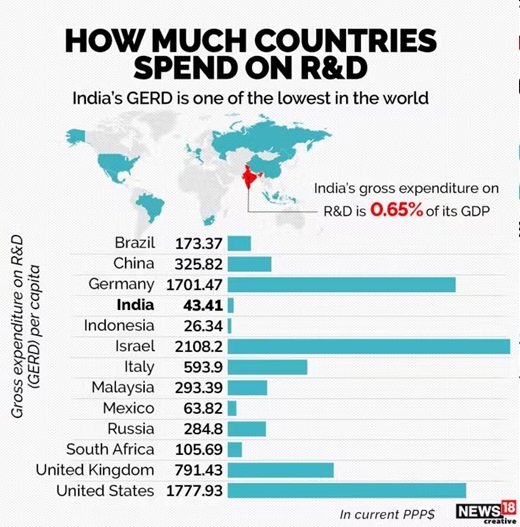The problem with the ‘70 hours a week’ line
Relevance
- GS Paper 3 Changes in industrial policy and their effects on industrial growth.
- GS Paper 4 Work culture
- Tags: #70HoursAWeek #WorkCulture #IndustrialGrowth #Competitiveness #GS2 #GS4 #UPSC
Why in the News?
N.R. Narayana Murthy’s striking statement, in which he suggests that young Indians should embrace a demanding 70-hour workweek as a means to enhance the country’s competitiveness. This has exposed a trend among business leaders who often mask their profit-driven motives by advocating virtuous ideals.
Issues with the statement
- Narayana Murthy’s claim that longer working hours led to the success of advanced countries like Germany and Japan is factually incorrect.
- This assertion lacks empirical evidence and does not align with the real reasons behind these countries’ success.
- Misplaced Burden on Workers for Productivity: Narayana Murthy wrongly places the responsibility of increasing productivity on the shoulders of workers. In reality, the lack of investment in innovation is the critical factor hindering productivity growth.
- Violation of International Labor Standards (ILS): It goes against international labor standards and the International Labour Organization’s (ILO) Decent Work Agenda.
- ILS and ILO’s Fundamental Conventions set working hour regulations to ensure decent and productive work for both men and women.
- Implications for Indian Industry’s Global Presence:
- Non-adherence to ILS can have serious consequences for Indian industry’s aspirations to expand their presence in global markets.
- Many advanced countries and supply chains increasingly require compliance with ILS as a prerequisite for market access, potentially limiting India’s competitiveness in the global arena.
Working hours in the advanced world
- Contrary to Narayana Murthy’s argument, advanced countries have seen a consistent decline in working hours per worker over the last century and a half.
- Germany’s weekly working hours have reduced by approximately 59%, from 68 hours in 1870 to less than 28 hours in 2017, while Japan’s working week decreased from 44 hours in 1961 to less than 35 hours in 2017.
- Reduced working hours often correlate with higher incomes and an improved quality of life as people can enjoy more leisure when they can afford it.
- More productive economies tend to have shorter working hours, while less productive and poorer economies require longer work hours to compensate for lower productivity.
Longer working hours: A recipe for early burnout
- The ILO emphasizes the influence of working hours and the organization of work on the physical and mental health and well-being of workers.
- Decisions regarding working hours also have broader implications for the overall health of an economy.
- The youth are considered India’s key asset for future development, and pushing them into such demanding work hours could have detrimental effects on their well-being.
Importance of Innovation for Productivity:
- The productivity of a country is closely tied to the strength of its innovation system.
- India’s low gross expenditure on research and development (GERD) as a percentage of GDP, at 0.65% in 2018 and declining to 0.64% in 2020-21, is one of the lowest in the world.
- The private sector’s share in India’s R&D spending decreased from 45% in 2012-13 to 41% in 2020-21, indicating a lack of significant private sector involvement in research and development.
- In contrast, countries with stronger innovation systems, such as Japan, Korea, the United States, Germany, and the UK, have much higher private sector contributions, illustrating their competitive edge in global markets.
These factors collectively contribute to the challenges faced by Indian enterprises in achieving a competitive edge and higher productivity on the global stage.
The importance of the ILS
Some of India Inc. has expressed support for a 70-hour workweek, disregarding the fact that such a move would contradict the ILO’s Convention No. 1, the Hours of Work (Industry) Convention, 1919, which established an eight-hour average working day as a benchmark.
- ILS in Global Trade Rules:
- International Labor Standards (ILS) are becoming increasingly prominent in global trade regulations.
- Advanced countries are emphasizing the inclusion of ILS in bilateral free trade agreements (FTAs), as evidenced by India’s ongoing negotiations with the European Union (EU) and the United Kingdom.
- Bilateral FTAs and ILS Inclusion:
- Bilateral FTAs, such as the one being negotiated between India and the EU, now feature chapters on Trade and Sustainable Development.
- These chapters aim to promote “decent working conditions for all,” encompassing areas like wages, working hours, and social protection, aligning with ILS principles.
- ILS in the Indo-Pacific Economic Framework for Prosperity (IPEF):
- ILS plays a central role in the implementation of IPEF, a 14-country initiative focused on enhancing economic cooperation in the region, led by the United States with India’s participation.
- IPEF members have established agreements related to supply chain resilience, emphasizing respect for labor rights, which include the ILO’s Fundamental Conventions, covering acceptable working conditions regarding minimum wages and hours of work.
- Implications for Indian Companies in Global Supply Chains:
- To participate in supply chains among IPEF members and adhere to global labor standards, Indian companies must respect labor rights, including ILS, highlighting the importance of compliance with these standards for market access and international trade opportunities.
- Bilateral FTAs, such as the one being negotiated between India and the EU, now feature chapters on Trade and Sustainable Development.
Global Supply chain regulations
- European Union Regulations on Supply Chains:
- EU member-states have implemented “Supply Chain Due Diligence” regulations, requiring companies to establish due diligence processes to address adverse impacts related to issues such as slavery, child labor, labor exploitation, and environmental degradation within their supply chains.
- France’s Corporate Duty of Vigilance Law:
- It was enacted as the Corporate Duty of Vigilance Law in 2017.
- This law applies to French companies with a workforce of at least 5,000 employees in France or 10,000 worldwide, including subsidiaries.
- It mandates the creation of a “plan of vigilance” to identify and prevent serious infringements on human rights, fundamental freedoms, personal health, and safety.
- Germany’s Supply Chain Due Diligence Act:
- Germany passed the Supply Chain Due Diligence Act in 2022, making it mandatory for German companies with 3,000 or more employees to monitor and take action against human rights violations, including forced labor, both within their own operations and those of their direct suppliers.
- This requirement applies irrespective of whether the activities occur in Germany or abroad.
- EU’s Corporate Sustainability Due Diligence Directive:
- Recently, EU member-states collectively adopted the Corporate Sustainability Due Diligence Directive in 2023.
- This directive compels companies to conduct due diligence to identify and, if necessary, prevent, end, or mitigate the negative impacts of their activities on child labor and labor exploitation.
- Companies are required to assess the impact of their activities on all value-chain partners, including suppliers, sales, transport, distribution, and storage.
- Global Trend towards Strict Enforcement of International Labor Standards (ILS):
- As the developed world increasingly emphasizes adherence to ILS within global supply chains, it is crucial for India Inc. to align with these standards.
- India Inc. cannot afford to support any measures that weaken labor rights, considering the global shift towards more rigorous enforcement of such standards.
Source: The Hindu
Mains Question
Discuss the implications and challenges for Indian industries in upholding labor rights. (150 words)






